- Home
- Tom Savage
Mrs. John Doe Page 2
Mrs. John Doe Read online
Page 2
She thanked the grandson and tipped him, then rinsed her face with cool water in the bathroom and took a brush to her hair. She didn’t bother changing out of her travel clothes, a black blouse and skirt and beige trench coat—what she called beige, anyway; the catalog had called it toffee. She returned to the lobby, where Bill was waiting. They got back into the car and rode in relative silence, due north, to their next destination.
When the car arrived at the hospital, Nora drew in a steadying breath. Then she allowed Bill to take her arm and lead her inside, to the morgue.
Chapter 3
Dr. Gupta was very kind. The small Indian man in the well-tailored blue suit had an apologetic manner that actually made Nora feel somewhat stronger, more assured, as though she should be comforting him instead of the other way around. They’d been shown into his third-floor office, and now he’d brought them to a bank of elevators, one of which would take them down to the basement of the hospital.
“A formality,” he explained in his mildly accented English as they descended. “Mr. Howard has already been here, but we require an immediate relative. Otherwise, I wouldn’t—”
“It’s okay,” Nora said. “It’s quite all right. I—I want to see him.”
The elevator opened into another corridor lined with offices, at the end of which was a large gray area with gray carpets, couches, and chairs. The waiting room, Nora thought with a shudder. An old woman and a middle-aged man sat together on a couch, probably a grieving wife and son, but otherwise the place was empty. Nora glanced at Bill Howard, who chose a seat across the room from the others and said, “I’ll be right here.” She nodded and handed him her shoulder bag, and Dr. Gupta led her over to another door. Nora braced herself when he opened it.
It wasn’t as bad as she’d imagined it would be. Industrial tubes concealed in a false ceiling brightly lighted the big, long chamber, and the temperature dropped some fifteen degrees the moment they entered. The walls were lined with shiny metal stacked drawers above the green linoleum floor. She’d half expected to find the cast of CSI hunched over stainless steel tables with frightening-looking drains, burrowing rubber-gloved hands into gaping chest cavities. But no such horror was in evidence, only two silent young men in hospital blues awaiting the doctor’s instructions. The autopsy surgeries would be elsewhere, of course, down the hall or in a subbasement. She’d been watching too much television; this place was merely for storage. Storage of human beings. Her step faltered, and the doctor reached out to grasp her arm.
“It’s okay,” she said again. “I’m okay. Let’s do this.”
At a nod from the coroner, one of the orderlies went to a low drawer and pulled it open, then stepped back, discreetly out of the way. Dr. Gupta gently peeled back the white sheet, revealing the head and naked shoulders. Nora came forward to stand beside the drawer, staring down.
She said, “Yes, this is my husband. This is Jeff.”
His face was slack, calm, almost smiling. He was pale, with a bluish tinge to his waxen skin. She studied the features in repose, the closed eyelids, and the faint bruise on his right cheek by his ear. She glanced down the length of the sheet that covered most of him, wondering what it concealed. Should she ask? Did she really want to know? In the end, Dr. Gupta made the decision for her.
“It was a heart attack,” he said quietly. “A sudden, massive myocardial infarction. It may comfort you to know that he was most likely, er, gone before the car struck the wall. That”—he pointed to the bruise—“was probably sustained when the air bag was deployed, but it didn’t develop, which indicates a postmor—er, well, otherwise, there is no visible damage.”
She nodded again. A single tear made its way down her face, and she reached up to brush it away. She wondered what she should say at this point, but the doctor saved her the trouble once more.
“I’ve called it an accident, officially. There won’t be any further legal activity, no inquest or anything like that. You’re free to take him home. One thing: He had heart and liver damage, and some of the scarring goes back years. Was he on medication for it?”
She shook her head and told the truth. “This is the first I’m hearing about it.” Then she said, “I’m going to have him cremated. Can—can that be done here?”
“Of course.”
“I mean, now?”
Dr. Gupta nodded. “Yes, we’ll see to it. If you’ll come back tomorrow afternoon, I’ll have everything ready.”
“An urn?” she asked.
“A box,” he said. “You may choose the final containment when you’re back in New York. That would be best.”
“And the—the transportation?”
“Your airline will be able to assist you. They’re used to these things.” More quietly, he added, “With security these days, I’m afraid it will have to be the cargo hold.”
She didn’t know what to say to that, so she simply nodded again. Another tear ran down her cheek.
“There are a few forms for you to sign,” he said. “My assistant is bringing them down from my office. Are you—are you ready now?”
“Yes,” she whispered. She reached out as though to touch the upturned face on the steel pallet, but her hand stopped before it reached its destination, slowly returning to her side. At a nod from the doctor, the orderly pulled up the sheet and rolled the big drawer shut. The harsh metallic clang seemed to reverberate in the frigid, sterile room.
A few other people had arrived in the waiting area by the time she and the doctor rejoined Bill Howard there, but she took no notice of them. She moved directly into the arms of her friend, her husband’s friend, and wept against his shoulder. Then they all sat in a corner of the waiting area. A young Asian woman in a white lab coat arrived with legal papers and a big, sealed manila envelope. Nora signed a Certificate of Death, a Certificate of Formal Identification, a Receipt of Personal Effects, and a Certificate of Waiver of All Pursuant Claims, whatever that was—probably so she couldn’t sue the car’s manufacturer or the City of London for having erected a stone wall on Holland Park Avenue. She signed it anyway, thinking all the while of the body in the drawer next door. How small he’d seemed, and how fragile. A heart and liver condition of long standing…
“The, er, personal effects are here,” Dr. Gupta said. The assistant handed her the manila envelope containing a plain brown wallet, a key ring with three keys, a disposable cardboard camera, and a small white box. Nora opened this last item, a jewelry case. She removed a layer of cotton and stared.
It was a simple gold chain with a heart-shaped locket. She snapped it open and found a tiny, recent photo of Jeff, smiling confidently into the camera. In the box under it, nestled in a second layer of cotton, was a miniature envelope with a card. Happy Birthday! Inside the card, in Jeff’s handwriting: Pal, always keep me close to your heart. Love, J.
Pal. His private name for her; only the two of them knew what it meant. Her forty-eighth birthday was in three weeks, July 21, and he’d already bought her a gift. The wallet held two hundred forty pounds and two photos, one of her and one of Dana. Jeff’s credit cards, insurance cards, gym membership, and all the other things that he normally carried were absent, even his driver’s license. She’d never seen this wallet before either. It certainly wasn’t Jeff’s usual wallet, the one she’d given him years ago. It wasn’t real leather but plastic, what she’d heard called pleather.
She turned to look at Bill. “What about his—”
“It’s okay,” her friend assured her. “His other wallet was at his place, and everything was there. All his belongings too. No need for you to worry about it now. We’ll pack it up and send it to you.”
“That’s all, really,” the doctor said. “We disposed of the clothes he was wearing. They were…” He trailed off, then quickly handed her an engraved business card. “If you need an official report of the accident for insurance purposes, refer your carrier to me. The police in Kensington didn’t make one. They have no record of him, only of the inciden
t itself. They listed the driver as, er, John Doe. I’ll notify them of his identity.”
“My company will take care of all that, Doctor,” Bill told him, and Dr. Gupta nodded.
Nora looked around the crowded room, a mass of strange faces with eyes that all seemed to be watching her. She stood up slowly, fastened the gold chain around her neck, and placed everything else in her shoulder bag.
“Thank you for everything, Dr. Gupta,” she said. They shook hands, and she and Bill returned to the car, where his driver waited.
“John Doe,” Nora murmured as the car moved through the early evening traffic, back the way they’d come. “It’s as though he didn’t exist, as though he never existed.”
“No matter,” Bill said. “It’s just paperwork, and we’ll update the police. There wasn’t much for them to go on.”
“I guess. Still, I suppose that makes me Mrs. John Doe.” She felt a horrible urge to laugh. Instead, she stared out through the tinted window as the car traveled south, aware of the chilly air-conditioning and the cloying scent of vanilla air freshener. She couldn’t think in this lavish conveyance; she could barely breathe. When they were two blocks from the hotel, she glanced at her watch and said, “It’s nearly seven o’clock, and you have to meet that minister of the Crown or whatever. Could you drop me at the next corner? I’d like to walk, and the park is nearby. I want to be alone for a while. Would you mind?”
“Of course not,” he said. “I think some air would be good for you.” He instructed the driver, who immediately pulled over and got out of the car. The man opened the back door and handed her out. She bent down to thank Bill again, then stood up straight and smiled at the big man beside her. As he closed the back door, the driver suddenly leaned toward her, his gloved hand gripping her forearm, his lips inches from her ear, and whispered three words.
“Be careful, Pal.”
Nora turned to stare at the man, but he was already back inside the car, shutting his door and reaching for the steering wheel. She watched from the corner, breathless, as the limousine silently rolled away and vanished in the gathering darkness.
Chapter 4
Fog. Nora gradually became aware of it as she stood on the corner, half a block north of her hotel. A thin, cold vapor had arrived in the street, not yet a full-on particular but growing by the minute. No matter, she decided; she was still wearing the beige trench coat. She buttoned and belted it over her black blouse, skirt, and high-heeled boots, her informal version of widow’s weeds, grimly acknowledging the humor of the coat’s label: LONDON FOG.
Something had just happened, of course, something odd and possibly momentous, but Nora could see no point in standing here trying to figure it out. Better to move, and move quickly. London’s most famous meteorological peculiarity was never shy, and this light mist could soon become a swirling wall of condensation, freezing everything in its path. She wanted to walk before she had to go indoors.
She hurried down the sidewalk, past the Byron and on to the corner of Montague Place. She turned left and proceeded east, glancing over at the imposing British Museum as she passed by it. She came into Russell Square, crossed the street, and moved briskly through the wrought-iron gates at the southwest corner of her favorite spot in London. Only then, when she was inside, did she slacken her pace. She shifted her inner gears, slowing down to take in the beauty around her.
Russell Square Gardens was a lovely environment, wide green lawns dotted with tall chestnut trees, a lime grove, and lush flower borders teeming with many vivid colors. The diagonal sidewalks were lined with benches and iron lampposts, and they led from the four corners to the geographical center of the park, a round plaza ringed with more benches where a circular, ground-level fountain sent water gushing up into the air from the pavement itself. The square reminded her of Washington Square Park in New York City, so well remembered from her college days at NYU, and it was every bit as beautiful. That was one reason why she loved it here.
She moved forward along the path, clutching her collar in the growing mist as she arrived at the central plaza. She reached into her voluminous shoulder bag, where she kept her standbys: sunglasses, gloves, a foldaway umbrella, a black wool scarf, and a floppy, oversize black wool beret her daughter had given her years ago. The last two items would be useful now. She wound the thick scarf around her neck and tucked her damp hair up into the beret, setting it at a jaunty angle on the right side of her head.
There weren’t many people here at this hour, in this weather: a small elderly lady with a blue-rinsed permanent and a brown tweed suit that made her look like Miss Marple, walking an enormous brown dog; a teenage boy and girl wandering hand in hand over by the trees; a tall young man in jeans, sneakers, and a gray sweatshirt emblazoned with the crest of Manchester United, murmuring into a cellphone as he jogged in place a little way from her. Two tiny, identical red-haired girls in green coats ran around the burbling circle of the fountain, laughing, admonished not to get too close to the water by a heavyset, middle-aged black woman on a nearby bench. The little park café was closed for the night, and a few solitary figures ambled here and there in the hazy distance.
The children’s activity and the low conversation of the football fan were the only sounds here; even the traffic circling the square was muted by the trees and obscured by the strengthening fog. Soon, the edges of the park and the remote buildings would be invisible from where she stood. It was so peaceful here, almost as though she were standing in a country lane and not in the center of one of the world’s largest cities. Now, at last, she could be alone and think.
She’d only seen one dead body before today, and that had been her father. She had been twenty-two, an only child fresh from the NYU drama department and just beginning to get work in the theater, when Alec Hughes succumbed to pancreatic cancer. Her mother insisted on the full Irish Catholic send-off, complete with a viewing of the open casket at the inevitable wake. Nora stared down into the coffin in the living room of her family home in Port Jefferson, barely recognizing the shrunken, gray man inside it. She promised herself that she’d never do this to anyone, no matter their religious background, no matter their wishes. The Church frowned on cremation, but Nora had never been devout, much to her parents’ chagrin. She decided on cremation for herself and hers. Her mother, dead just four years after her husband, was the only exception. Nora’s two maternal aunts handled everything—another Irish blowout, with rambling speeches and drunken keening—but this time they mercifully kept the coffin shut.
With both parents gone, Nora threw herself into her work, winning a part in the national tour of a hit Broadway play. She was performing at the Kennedy Center in Washington, six months after her mother’s death, when she met Jeffrey Baron. He was part of a group, a charity function some senator’s wife had arranged that involved a performance of the play followed by a dinner party for four hundred at the Roof Terrace. The cast was invited, and she was seated next to the tall, handsome man from Connecticut who said he was in electronics. He also said he’d enjoyed her performance in this, the first professional play he’d ever seen. She liked his brown eyes and his hearty laugh. Before dinner was over, they discovered they had the Sound in common. He was from a little town near Bridgeport, directly across Long Island Sound from her hometown.
He drove her home that night, to the sublet in Georgetown where she was staying, and the next day he invited her out. He came to see the play again, twice. By the time they were married, she was already pregnant with Dana, and Jeff had told her the truth about himself; he wasn’t merely in electronics. They would live somewhere on the Sound, and they both loved travel and crossword puzzles and word games. He gave her a pet name, coined on their wedding day, when he first saw her married name written down. From that day on, he called her—
Pal.
That big man, Bill Howard’s chauffeur. Three whispered words: Be careful, Pal. How could a complete stranger possibly know about that? The car accident with no police record. The dea
th of “John Doe.” The body lying in the morgue with a long history of health problems. A gold locket on a gold chain: Always keep me close to your heart…
Nora Baron stood before the fountain in Russell Square Gardens, Bloomsbury, Camden, London, England. She stared out at the dark lawn, not seeing it, possessed by a sudden panic. The fog had arrived in earnest now, swirling before her eyes, the icy tendrils clinging to everything. She could feel it, cold against her face. The trees, the lawns, the great Victorian hotel across that road, the great museum across that other one; she couldn’t see them now. She was aware only of a rhythmic pounding sound somewhere behind her, and it seemed to be coming closer.
She blinked and looked around her, peering through the mist. The sweet old lady with the big dog; the teenage lovers; the jogger with the phone; the nanny getting up from the bench, calling the little twin girls to her as she buttoned her coat. It was time to go. It was time to take these children home while they could still see their hands in front of their faces. It was time to be careful.
Careful…
Pal…
Be careful, Pal. Be careful, Pal. Be—
Nora heard the little girl scream a split second before she felt the hard impact in the center of her back. Then she was lurching forward, flying through the air, through the blinding fog, and crashing heavily down onto the wet pavement.
Chapter 5
The little girl was still screaming, and someone else was shouting, “Hey, you!” The nanny. Another scream from farther away, probably the teenage girl. A dog barking. Then she heard footsteps running toward her from several directions at once.
Nora was lying facedown on the paving stones by the fountain, dazed. Her arms were outflung, and her beret had flown off to land somewhere nearby. Her left knee and her forehead above her left temple were throbbing; they must have struck the pavement when she went down. She wasn’t sure, really; it had happened so fast. She was gasping for air when she felt a sharp tug at her left shoulder. Someone grabbed her Coach bag and tore it from her arm.

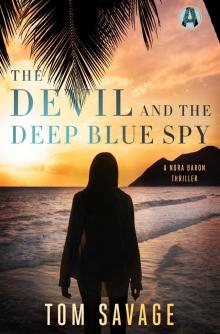 The Devil and the Deep Blue Spy
The Devil and the Deep Blue Spy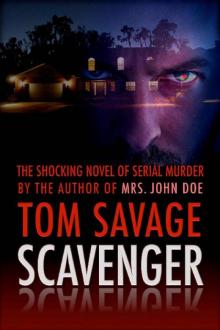 Scavenger
Scavenger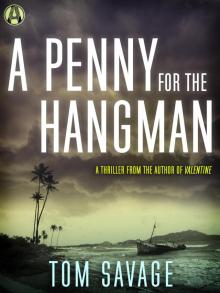 A Penny for the Hangman
A Penny for the Hangman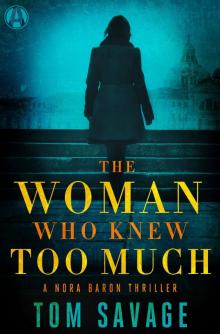 The Woman Who Knew Too Much
The Woman Who Knew Too Much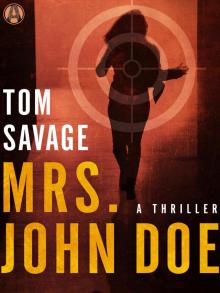 Mrs. John Doe
Mrs. John Doe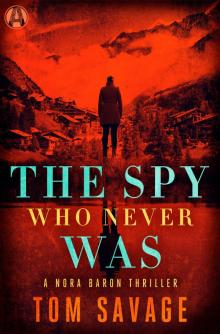 The Spy Who Never Was
The Spy Who Never Was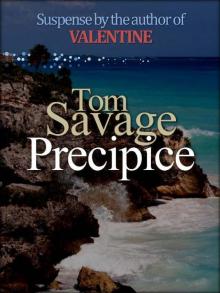 Precipice
Precipice